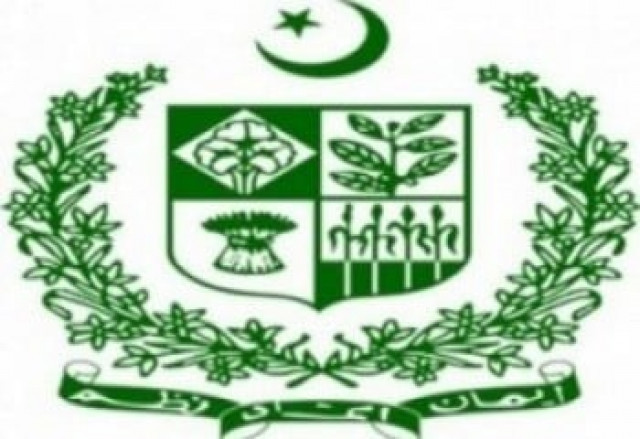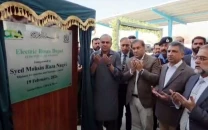Contours of a possible national unity govt
Amid growing speculation over regime change, three different probabilities are under consideration.

Contours of a possible national unity govt
The powerful security establishment and influential world capitals are contemplating blueprints of at least three different models to change what is viewed as a discredited political dispensation, top diplomatic and political sources confided to The Express Tribune.
In the proposed national unity government model, parliament would continue to function and the current cabinet would be made leaner with proportionately ‘less controversial and somewhat credible’ members from all parties.
Under this arrangement, Prime Minister Yousaf Raza Gilani may continue to be the chief executive of the country but the cabinet would comprise members from all political groups in parliament.
The size of the cabinet would be shrunk considerably, as also envisaged in the 18th constitutional amendment that parliament approved early this year. This dispensation would not require a fresh vote of confidence in the National Assembly.
But in case Gilani is shown the door, Foreign Minister Shah Mahmood Qureshi would be the leading contender for the premiership. Apparently, Qureshi enjoys the support of both the Americans and Saudi royals along with the For such a change the new premier would have to get a vote of confidence from the National Assembly.
A former political counsellor of the US consulate in Lahore, Brian D Hunt, who is supposed to be an insider of Pakistan’s intricate politics, is nowadays in the country and is believed to be involved in ‘discreet’ endeavours for a proposed change.
Top US diplomats assigned to the region have recently been advocating democracy as the best governing system for Pakistan but they never said Washington would continue to support the incumbent government as well.
The US officials in their statements restrict themselves to the support of a ‘constitutional democratic set-up’.
If things move ahead according to the script, all political parties would have cabinet slots proportionate to their strength in parliament.
Some two-and-a-half dozen names have so far been scrutinised by the security establishment to include in the incoming government.
From the Pakistan Peoples Party (PPP) Sardar Assef Ahmed Ali, Makhdoom Shahabuddin, Shahnaz Wazir Ali, Sughra Imam, Nazar Gondal and a few others are likely to be part of the future set-up.
Senator Ishaq Dar, Ahsan Iqbal, Khawaja Asif, Hanif Abbasi and Chaudhry Nisar Ali Khan are the probable names who are expected to represent the Pakistan Muslim League-Nawaz (PML-N) in the future cabinet.
The PML-Q’s Lt-Gen (retd) Javed Ashraf, a former head of Inter Services Intelligence (ISI), is likely to replace Interior Minister Rehman Malik, according to sources privy to all these developments.
Senate deputy chairman Jan Muhammad Jamali, Sheikh Waqas Akram, Tariq Azeem and Marvi Memon are among the other elected members from the former ruling party to be considered for ministerial slots.
Mushahid Hussain, the PML-Q’s secretary-general, is likely to be ‘accommodated’ in the cabinet as adviser to the premier because he is not currently a member of the parliament.
The MQM would also be part of the new setup with Babar Ghauri, Farooq Sattar and Haider Abbas Rizvi being the likely cabinet picks.
The Awami National Party (ANP) is also being considered for the dispensation to be remotely controlled by the security establishment. Afrasayab Khattak, Bushra Gohar and Zahid Khan are the likely representatives of ANP in the cabinet. Khyber-Pakhtunkhwa Information Minister Mian Iftikhar Hussain is expected to be given the position of premier’s adviser. The Jamiat Ulema-e-Islam-Fazl (JUI-F) are unlikely to be left out in the fresh arrangement. The party’s Senator Azam Swati and a couple of other stalwarts are also likely to be inducted in the broad-based set-up.
Besides, one or two members each from smaller parliamentary groups such as members from lawless tribal regions and Baloch nationalists are also expected to get slots in the national unity government.
The office of the president would be rendered a ceremonial position as envisaged in the 18th amendment that called for stripping the president of key powers. President Asif Ali Zardari would have two options; either to continue as a figurehead or he might be shown the exit door.
If this plan doesn’t succeed, there is another one as well.
According to Plan B, a no-confidence motion would be moved in the National Assembly against Gilani ultimately leading to the dissolution of parliament and the provincial assemblies.
Under this scenario, mid-term polls would be held in the country. A n interim set-up would be brought in to hold general elections. But there wouldn’t be any concrete timeframe for that. A quasi-political setup is the third option that envisages installing an administration of technocrats and politicians for the period of two to three years.
There have of late been very clear signals that political parties including the PML-N, PML-Q, ANP and MQM are supporting what their top leaders called a change ‘within the constitutional parameters’.
On Thursday in Lahore, PML-N chief Nawaz Sharif said he can no longer back a government, which doesn’t seem to be ready for a ‘change for the better’ and would endorse a ‘constitutional change’.
Within the PPP, differences have crept up among the top leadership. Sources said Premier Gilani had told a gathering of the party’s federal and state ministers on Friday night that he cannot resist the Supreme Court decisions any more. A day later, he called for a list of bureaucrats who benefitted from the now-scrapped NRO.
The move appears to be an early sign of the government’s seriousness to implement the ‘hostile’ decisions of an increasingly independent judiciary. The PPP leadership, however, is bent upon fighting back what it described as a vicious ‘conspiracy’ against democracy.
And if a military’s engineered plan is once frustrated in Pakistan, it would be a drastic change in the country’s chequered political history.
Published in The Express Tribune, September 20th, 2010.



















COMMENTS
Comments are moderated and generally will be posted if they are on-topic and not abusive.
For more information, please see our Comments FAQ